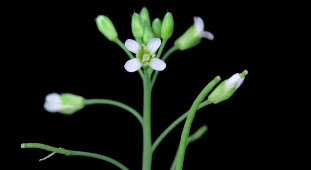£2.4million to decode a new genetic enigma
Published On Tue 13 Jan 2015 by Roddy Isles

Finding the solution to a new level of genetic complexity could help unlock the secrets of the DNA code in plant and human genomes.
Scientists at the Universities of Dundee and Nottingham have been awarded more than £2million to investigate part of the process in which DNA is copied and modified.
Two grants have been awarded by the Biotechnology and Biological Sciences Research Council (BBSRC) to Gordon Simpson, Professor of Molecular Genetics at the University of Dundee, and colleagues.
All life on Earth uses three types of biological molecules that serve critical functions in the cell. Proteins are the workhorse of the cell and carry out diverse catalytic and structural roles, while the nucleic acids, DNA and RNA, carry the genetic information that can be inherited from one generation to the next.
“What we are working on is deciphering what plant genomes really encode, which is pretty fundamental to their existence and their specific characteristics,” said Professor Simpson.
“The genome holds the DNA code but that has to be copied in to RNA and when that happens a poorly understood process called methylation causes the RNA to be modified. So the code is effectively changed at that point. What this means is that by looking at the DNA sequence alone we cannot really tell what the code is.
“This funding recognises the importance of recent discoveries made in our lab and addresses fundamental issues of genetics of widespread relevance.”
The findings that led to this latest stage of research were made by two PhD students working in Professor Simpson’s laboratory, Kasia Rataj and Vicky Zacharaki, both of whom came from overseas to join the research team in Dundee.
“This has been fantastic work by the people in my lab, particularly Kasia and Vicky,” said Professor Simpson.
The funding will maintain the very successful collaboration between Professor Simpson’s lab and that of Professor Geoff Barton’s computational biology team in Dundee and establishes new links with Dr Rupert Fray at the University of Nottingham.
The team has ambitions to communicate the science behind RNA biology to a wider audience. To make this possible, the Dundee-based scientific animation company Vivomotion has been commissioned to develop the first-ever computer-graphic animations of the processes involved.
Roddy Isles
Head of Press
TEL: 01382 384910
MOBILE: 07800 581902
E-MAIL: r.isles@dundee.ac.uk